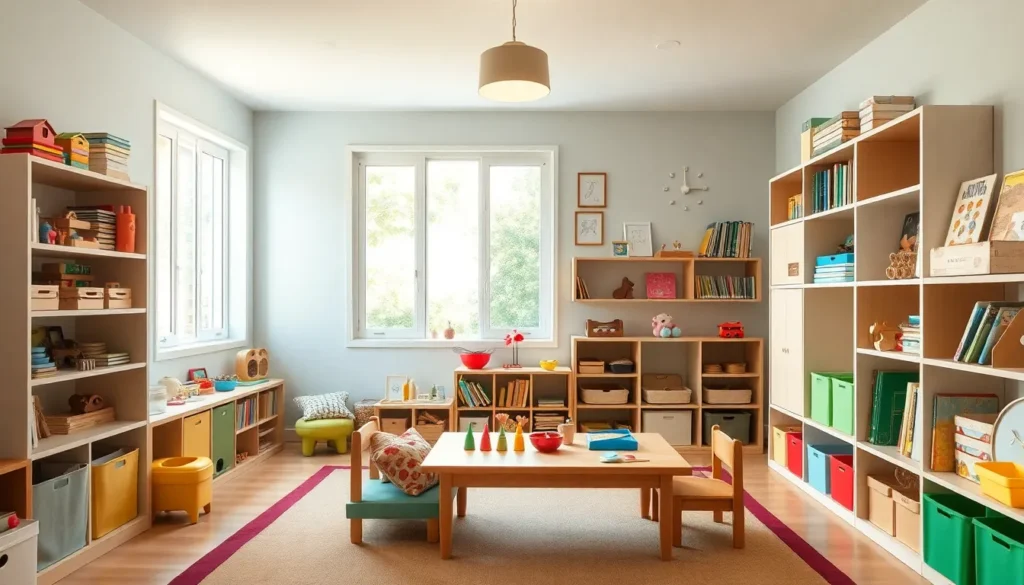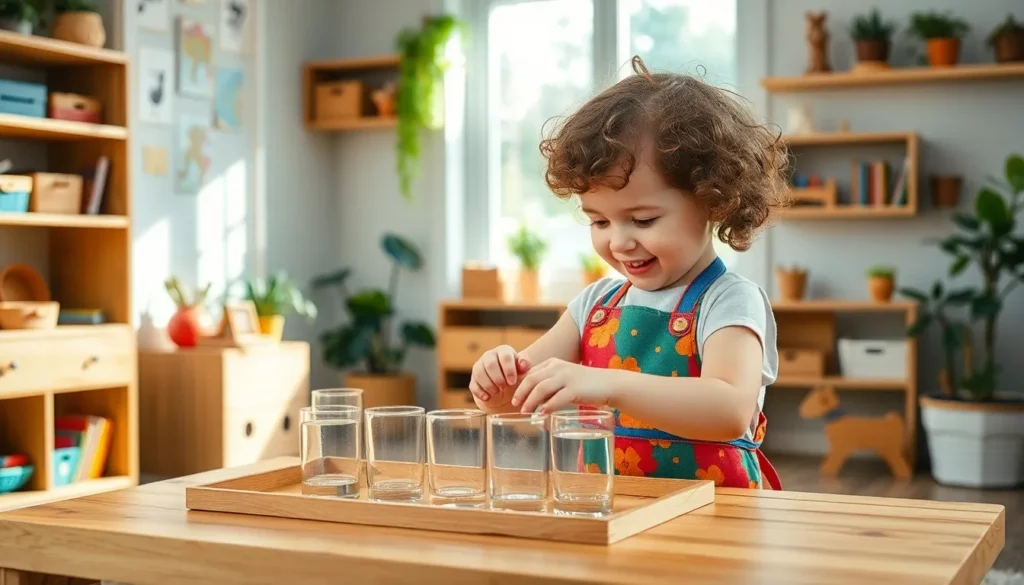Table of Contents
ToggleImagine turning your home into a vibrant learning playground where curiosity reigns and independence flourishes. The Montessori philosophy isn’t just for classrooms; it’s a magical way to transform everyday life into a rich educational experience. With a sprinkle of creativity and a dash of freedom, parents can cultivate an environment that encourages children to explore, discover, and learn at their own pace.
Understanding Montessori Philosophy
Montessori philosophy emphasizes respect for children’s natural development and learning styles. It focuses on creating a supportive home environment to nurture independence and curiosity.
Key Principles of Montessori Education
Respect is fundamental in Montessori education. Children thrive when adults acknowledge their capabilities and interests. Prepared environments promote exploration; parents provide materials that spark curiosity. Freedom of choice enhances decision-making skills, allowing children to engage in self-directed activities. Structured routines, alongside flexible learning opportunities, contribute to a child’s sense of security and autonomy.
Benefits of Montessori at Home
Integrating Montessori principles at home fosters independence in children. They gain confidence by making choices and handling tasks independently. Parents observe enhanced concentration levels as children engage in self-directed activities. Encouraging hands-on learning leads to real-life skills, preparing children for future challenges. Overall, adopting Montessori strategies nurtures a lifelong love for learning, allowing children to explore their interests actively.
Setting Up a Montessori Environment

Creating a Montessori environment at home encourages exploration and self-directed learning. Several key elements facilitate this process, enabling children to thrive.
Creating a Child-Centered Space
A child-centered space prioritizes accessibility and engagement. Arrange furniture and materials at a child’s height, allowing independence and ease of use. Use open shelving to display learning materials, promoting choice and fostering responsibility. Natural light and inviting colors enhance the atmosphere, encouraging focus and creativity. Designate specific areas for different activities, such as art, reading, and practical life skills. Such organization supports a child’s ability to navigate the space freely, enhancing their sense of ownership and belonging.
Choosing Age-Appropriate Materials
Selecting age-appropriate materials is crucial for effective learning. Start with simple, versatile items that spark interest, such as Montessori toys or everyday household objects. Prioritize materials that promote fine motor skills, problem-solving, and sensory exploration. Books that match a child’s developmental stage foster language and imagination. Increase complexity as the child grows, introducing more challenging activities and tools. Remember to rotate materials regularly to maintain engagement and inspire ongoing discovery. This approach nurtures a sense of achievement and keeps the learning environment dynamic.
Implementing Montessori Activities
Integrating Montessori activities into the home enhances children’s learning experiences. Different strategies focus on practical life skills and sensory exploration.
Practical Life Skills
Encouraging practical life skills offers numerous benefits for developing independence. Children can engage in daily tasks, such as cooking, cleaning, and gardening. Providing age-appropriate tools fosters responsibility and confidence. Simple activities, like pouring water or sorting utensils, support fine motor skills and hand-eye coordination. Children thrive when given opportunities to participate in household routines. Creating a designated workspace helps them take ownership of their tasks. Observing parents and imitating actions accelerates learning, cultivating essential real-life skills.
Sensory Exploration and Learning
Promoting sensory exploration enriches children’s understanding of their environment. Incorporating various materials encourages hands-on learning experiences. Using items with different textures, weights, and colors stimulates their senses. Creating sensory bins, filled with rice or beans, allows for open-ended play. Engaging in activities like painting or water play fosters creativity and self-expression. Designating a quiet corner for exploration provides a calming space for children. Integrating nature elements enhances their connection to the outdoors. Emphasizing sensory experiences builds cognitive skills while nurturing curiosity.
Nurturing Independence and Responsibility
Fostering independence and responsibility in children significantly enhances their development. Montessori principles support this by creating opportunities for children to make choices and build confidence in their abilities.
Encouraging Decision-Making
Empowering children to make decisions cultivates their problem-solving skills. Parents can provide options for daily activities, such as choosing between playtime or reading. By allowing kids to select their clothes or snacks, they practice accountability for their choices. Observing how they navigate these decisions promotes critical thinking. Providing a supportive atmosphere encourages children to express preferences without fear of failure.
Supporting Self-Directed Learning
Supporting self-directed learning enables children to explore interests autonomously. Setting up learning areas with accessible materials invites exploration. Age-appropriate resources motivate children to engage independently with tasks. Regularly rotating materials ensures sustained interest in activities. Encouraging children to set learning goals fosters responsibility for their own education. Parents should act as guides rather than instructors, helping to reinforce children’s drive to learn dynamically.
Assessing Progress and Adapting Approaches
Monitoring children’s growth in a Montessori setting requires regular evaluation of their development. Tracking developmental milestones helps identify specific areas where a child excels or may need support. Observations should focus on physical, emotional, and cognitive growth, ensuring that learning aligns with their developmental stage. Utilizing checklists or journals can aid in this process.
Tailoring activities based on individual needs enhances engagement and learning potential. Each child possesses unique interests and learning styles, which shape their educational journey. Parents can customize activities to match these preferences, promoting a deeper connection. Encouraging children to choose tasks empowers them to explore based on their curiosities. Regularly reassessing the difficulty of activities ensures they remain challenging yet achievable, supporting continuous growth.
Embracing the Montessori philosophy at home can significantly enhance a child’s development. By creating an environment that encourages independence and curiosity, parents can foster a love for learning that lasts a lifetime. Simple adjustments like arranging materials at a child’s height and promoting practical life skills can make a world of difference.
Regularly assessing children’s progress ensures that learning remains engaging and tailored to their needs. With a focus on choice and responsibility, children gain confidence and develop essential problem-solving skills. Adopting these principles not only enriches their educational journey but also strengthens the parent-child bond through shared exploration and discovery.





